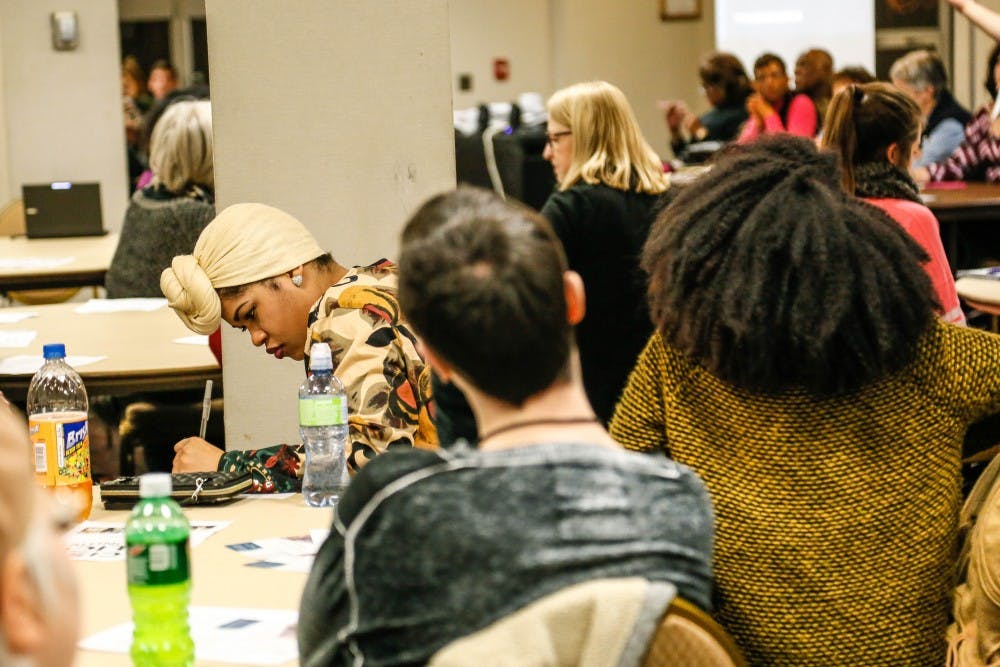Black Lives Matter action teams discuss goals for addressing racism in Mount Pleasant

Actions teams shared their plans and goals for addressing racism on campus and in the community during a Community Action for Black Lives Matter forum on Thursday at Central Michigan University.
Community Action for Black Lives Matter is a Mount Pleasant Area Diversity Group project. This month’s meeting was one of CMU’s Martin Luther King Jr. Week events.
Saginaw junior Peyton Pruitt said the meeting felt productive and interactive.
Pruitt said two of the main problems on campus are the prevalence of microaggressions and the ignorance to the existence of racism. She said when she’s talked to people who are not of color, they don’t think racism is an issue on campus.
“I think if Central Michigan stood behind movements like this more publicly, it would get the word out and be a positive influence on the community,” Pruitt said. “I think if they publicly said, ‘Black Lives Matter,’ that would be really inspirational.”
The event began with leaders from each action team describing their work and plans.
The K-12 Mobilization team aims to bring anti-racist programs into schools and educate students about Black Lives Matter.
Political Science Professor Joyce Baugh said the team wants to pull together resources to educate students, but also aims to figure out ways to educate teachers.
She also talked about the concept of the school to prison pipeline, explaining that people of color are more likely to be suspended and expelled in school, which prevents them from receiving a proper education.
“That’s how they end up in the criminal justice system,” she said.
The citizen oversight team aims to get a community oversight board for police agencies in Mount Pleasant. However, most cities that have these boards are larger than Mount Pleasant and have larger budgets, said emeritus professor Joyce Henricks. The group is also focusing on police accountability, exploring police training and body cameras.
Requiring body cameras for police officers gets complicated, said emeritus professor Rob Newby, and as of now, the Saginaw Chippewa Tribal Police is the only police agency in Mount Pleasant that uses them.
Henricks said each action team is interconnected.
“You can’t change (the criminal justice system) without changing the rest of society,” she said.
The community mobilization team is working to get people comfortable talking about racial issues.
“A lot of people don’t think there’s any problem whatsoever (with racism) or they don’t know how to talk about it,” emeritus professor Norma Bailey said.
The action team also wants to host workshops in the community to educate people on institutional racism and white privilege.
“If people don’t feel safe asking questions, then they don’t say anything,” Bailey said.
Shayna Haynes, the Student Government Association Diversity Committee Chair, talked about the Reach Beyond Bias initiative, which challenges students to reach beyond their implicit or unconscious biases.
The CMU junior presented the Reach Beyond Bias website, where people can submit their stories of discrimination and take the Race Implicit Association Test to test their racial bias.
“The reasons we’re here is because Black Lives Matter,” Haynes said. “This is a platform for people to mobilize. We want to avoid problems rather than reacting to problems.”
This action team also hopes get students, faculty and staff involved in activities that promote racial justice.
After each action team presented, attendees, which consisted of students, faculty and community members, could choose a group to meet with and discuss ideas.
Chelsea Bowens, president of the African Student Association at CMU, thinks there needs to be more recognition of diversity and inclusion issues among students and faculty on campus.
“There needs to be more light shed on it,” she said. “Another problem is that it’s always the same people at the events (related to these issues).”



